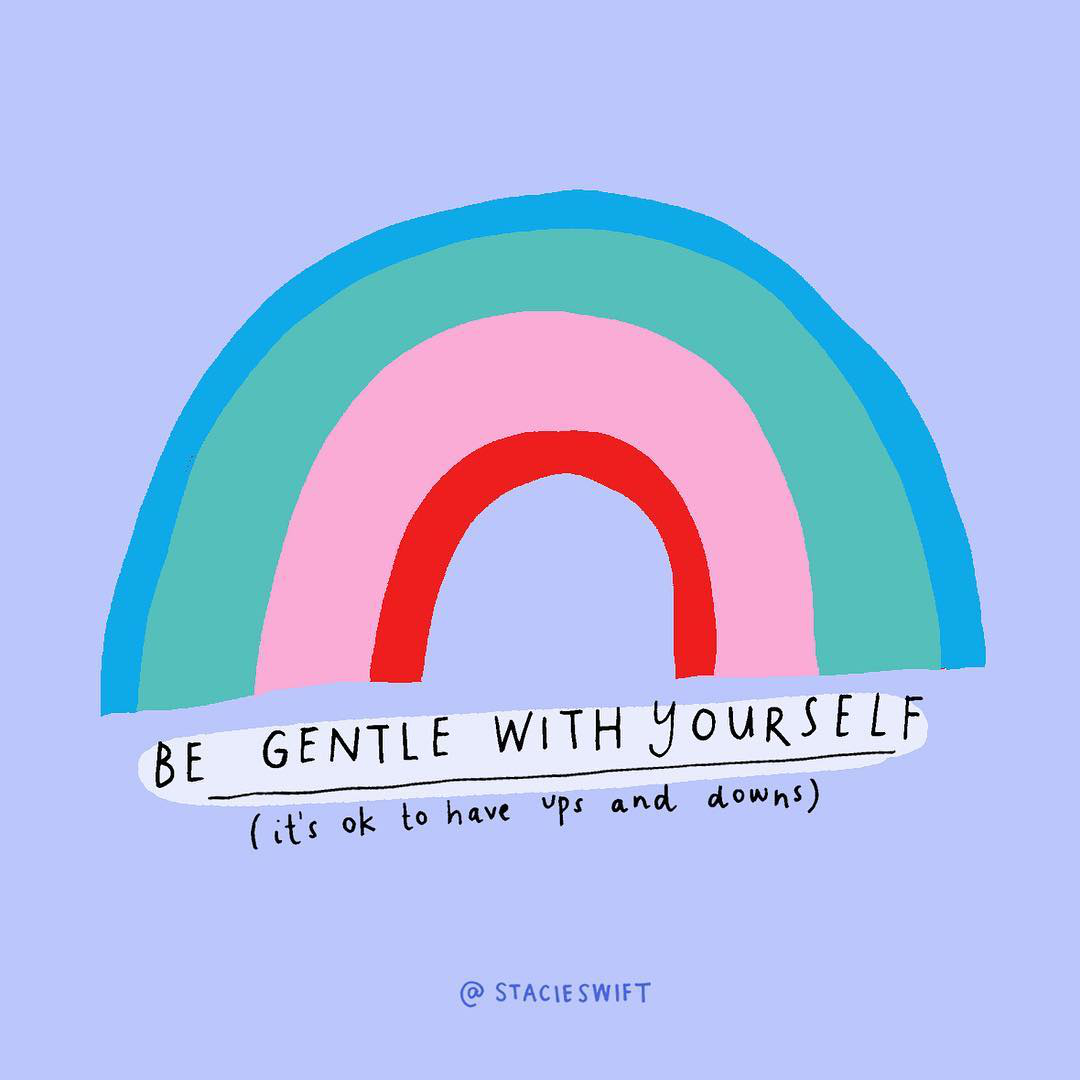Anxiety and worries

Artwork credit: @stacieswift. The artwork depicts a blue, mint green, pink and red rainbow on a purple background. Underneath the rainbow, it reads: 'Be gentle with yourself (it's ok to have ups and downs)'. Be gentle with yourself is underlined.
Whether you’re at primary school, a teenager or beyond, you may find yourself waking up in the night, or having difficulty getting to sleep in the first place.
You may be anxious or worried - about being alone, the dark, or imaginary scary monsters and ghosts. You might feel you want someone there with you as drop off to sleep or if you wake in the night.
Worries or anxieties can also be about:
- friendships or bullying
- school work
- family relationships
- divorce or separation
- changes in routine such as a new school or moving house
If you’re having problems with sleeping, you’re not alone. Most of us do at some point, and for lots of different reasons
Nightmares & bad dreams

Dreams help us process what is going on in our lives, including any fears and worries. These may manifest themselves as nightmares and are usually nothing to worry about. It helps to talk about bad dreams (or even draw them) to identify what may be causing them. Causes of nightmares could be as simple as something scary you saw in a film to more serious things such as bullying or someone hurting you.
Night terrors
These are more upsetting for parents or carers, as the person seems to be wide awake and terrified of something, but is asleep, and usually doesn’t remember them. They may reflect worries about something stressful going on at the moment, or they may not. Night terrors are a phase that often passes quite quickly.
Wetting the bed
Altered sleep problems

Artwork credit: @stacieswift. The artwork depicts a piece of torn paper stuck to a pink wall with pink pieces of sellotape. On the piece of paper, it reads: 'It's okay if simple things don't feel very simple. Be gentle with yourself'. The word feel is underlined. Underneath is a little red heart.
If you tend to push boundaries and stay up late watching TV, gaming or staring at your phone or tablet screen, this may alter your sleep patterns.
It’s not uncommon for teenagers to reverse their sleeping patterns, staying awake late into the night and then feeling sleepy during the day.
This can interfere with school work and home life, and cause stress with parents. Have some screen-free wind-down time (reading a real book is ideal) before going to bed at a reasonable time each night.
Get support and tips
Chat to your GP if your sleep problems continue for a long time, things you try at home are not helping, or if you are worried about an emotional or physical problem. Severe sleep problems can be a sign of depression. Young people with attention deficit hyperactivity disorder (ADHD) may also have problems with sleep.
Our bloggers and Activists share their tips for dealing with sleep problems.
-
Try relaxing without your phone
"Rather than looking at a phone until you're tired, relax by reading a book, writing a journal entry or listening to music."
-
Wrap yourself up
"Put a soft blanket on top of your mattress as this can help you relax. You could try and wrap yourself up in the duvet as this can help with sensory issues."
-
Listen to relaxing music
"Things that help me are, listening to relaxing music, trying to stick to a time to go to bed and get up, smells you associate with calmness, limiting screen exposure and a notebook to jot down any worries."
-
Give yourself sometime
"Give yourself time to wind down before bed. Try to do something relaxing or boring so that you'll feel tired."
-
Try downloading blue light filter
"If like me you're on your phone right up until you sleep, it’s a good idea to download a blue light filter."

We’ve all experienced that annoying feeling – you’ve had a busy day and all you want to do is go to sleep, but there seems to be a constant flow of thoughts swirling around in your brain that makes this simple task almost impossible. During my struggle with mental health, I tried to overcome this problem by establishing a routine with the hope of improving my sleep.
Our Activists and other young people share their experience of dealing with sleep problems:
-
Wind down
"It's finding what works best for you. Definitely implement some sort of routine to wind-down before bed. You could try, yoga, meditation, different breathing exercises or a hot bath."
-
Plenty of time
"If you experience anxious thoughts when you're trying to sleep, remind yourself that there will be plenty of time to think about those things in the daytime."
-
Ask for help
"Don't be scared to reach out. Insomia is heavy and overwhelming. Not sleeping can affect your everyday life, even simple tasks. Wanting help, whether it's therapy, medication, or anything else, is perfectly okay."
Where to get help
If something is keeping you up at night, even if you're not sure what it is, here are some services that can support you.
-
Samaritans
Whatever you're going through, you can contact the Samaritans for support.
- Opening times:
- 24/7
-
Childline
If you’re under 19 you can confidentially call, chat online or email about any problem big or small.
Sign up for a free Childline locker (real name or email address not needed) to use their free 1-2-1 counsellor chat and email support service.
Can provide a BSL interpreter if you are deaf or hearing-impaired.
Hosts online message boards where you can share your experiences, have fun and get support from other young people in similar situations.
- Opening times:
- 24/7
-
The Mix
Offers support to anyone under 25 about anything that’s troubling them.
Email support available via their online contact form.
Free 1-2-1 webchat service available.
Free short-term counselling service available.
- Opening times:
- 3pm - 12am, seven days a week





